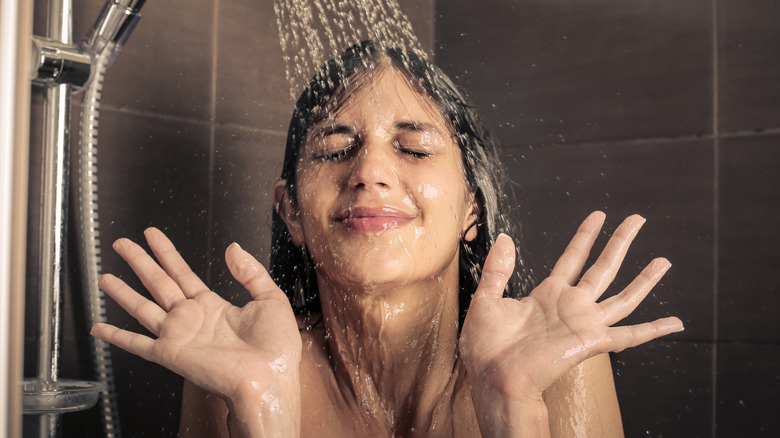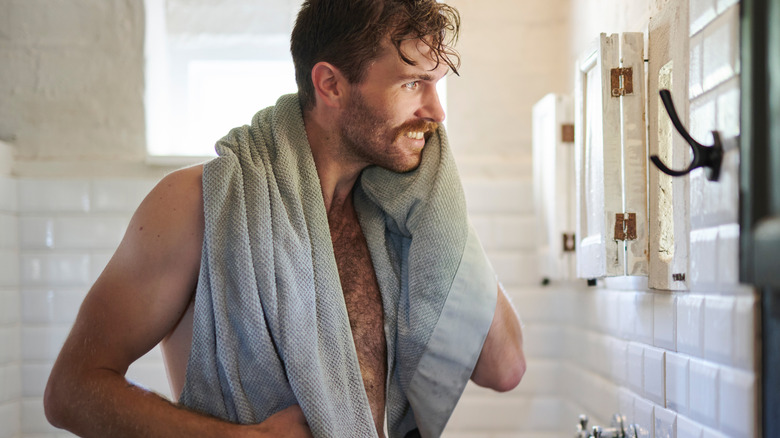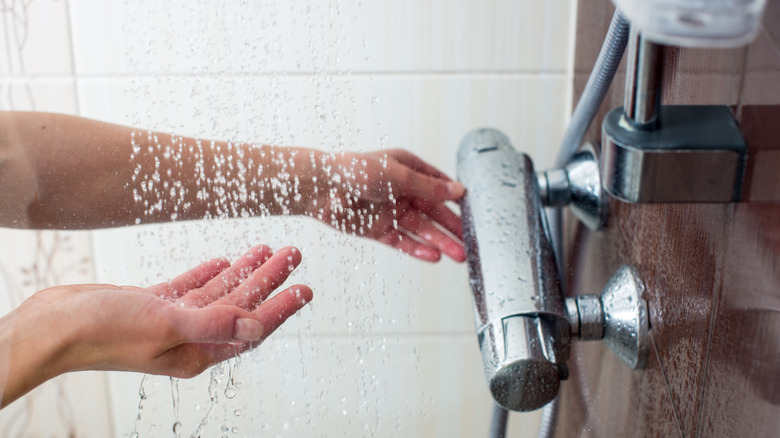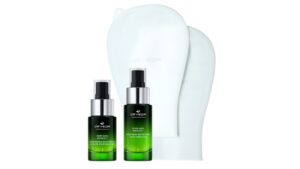
Bowie15/Getty Images
It’s hard to describe the all-encompassing feeling of relaxation, relief, and comfort that can come from a steamy shower. After all, shower water can affect your body, especially as you turn up the temperature. Maybe that’s why a 2024 Harris Poll found that nearly seven out of 10 American adults prefer to take very warm or hot showers. (Women were about two times more likely than men to opt for hot.) But would your body turn out to be just as clean and refreshed if you never bothered to turn up the heat again?
Let’s look at the mental health aspects of hot-water bathing. A 2012 study from the Journal of The Japanese Society of Balneology, Climatology and Physical Medicine asked 6,000 adults about their habits, including whether or not they regularly bathed in hot water. Those who did reported that they perceived their stress levels as low.
Standing under a hot shower at night might be a way to combat sleep disorders as well. As shown in the findings of a 2019 review of 17 published articles for Sleep Medicine Reviews, passive methods to heat the body — including taking hot showers for up to two hours before hitting the sack — may shorten the time it takes to get to sleep.
Warmth promotes sleep and coolness pampers skin

Adene Sanchez/Getty Images
But that doesn’t necessarily mean you’d be stressed out if you were stranded on a desert island and unable to access hot showers again. (This presumes you could take a nice, cool shower under the first available waterfall.) A 2023 study from Biology found that adults who engaged in a cold-water bath for five minutes felt their moods and their physical alertness and attentiveness were improved afterward.
That’s not the only potential cold-water shower benefit. You also could wind up feeling less itchy, especially if you have the symptoms of dry skin and need extra moisture. A 2022 study in the Journal of Clinical Medicine found that routine exposure to hot water disrupted the natural protective barriers of the skin more than routine exposure to cold water, at least in hand washing.
This conclusion is supported by advice given to Healthline by licensed cosmetologist Sophia Knapp. In a 2021 interview on cold-water face washing, Knapp said, “If you have chronically dry skin, hot water can strip your sebum levels (oils) and exacerbate the issue, so cold water is a good alternative.” Though she added that warmer water made it easier to wash away pollutants and germs, she was supportive of cold rinsing to “tighten pores and promote blood circulation for a healthy glow.”
Bacterial buildup a possible result of cold-water bathing

Viktorcap/Getty Images
Given Knapp’s cautionary note on the cleaning power of hot versus cold water, you might worry that saying goodbye to steamy showers could hamper your ability to get squeaky clean. And you might be right, at least according to some dermatologists who were interviewed for a Byrdie article. The experts seemed to agree that while hot water wasn’t a good choice for cleaning due to its reputation for drying skin, neither was cold water. Again, they stressed that cold water just wasn’t as efficient at loosening dirt. Said board-certified dermatologist Dr. Susan Massick, “Water temperature is like the Goldilocks rule: not too hot, not too cold.” Board-certified dermatologist Dr. Rachel Jaliman further explained the reason for this phenomenon, which is that cold water may cause pore constriction, therefore keeping dirty particles within the pores. (This is why washing one’s face with cold water is among the biggest mistakes people make with skincare.)
Back to the original question: What would happen if your body were only exposed to cold-water showers? Your skin might feel healthier and less dry, which could be an asset. Plus, you could conceivably experience the same physical and emotional outcomes as you would from hot showers. But you might end up having to scrub more diligently to get rid of daily deep-down dirt particles.
Credit: healthdigest.com









